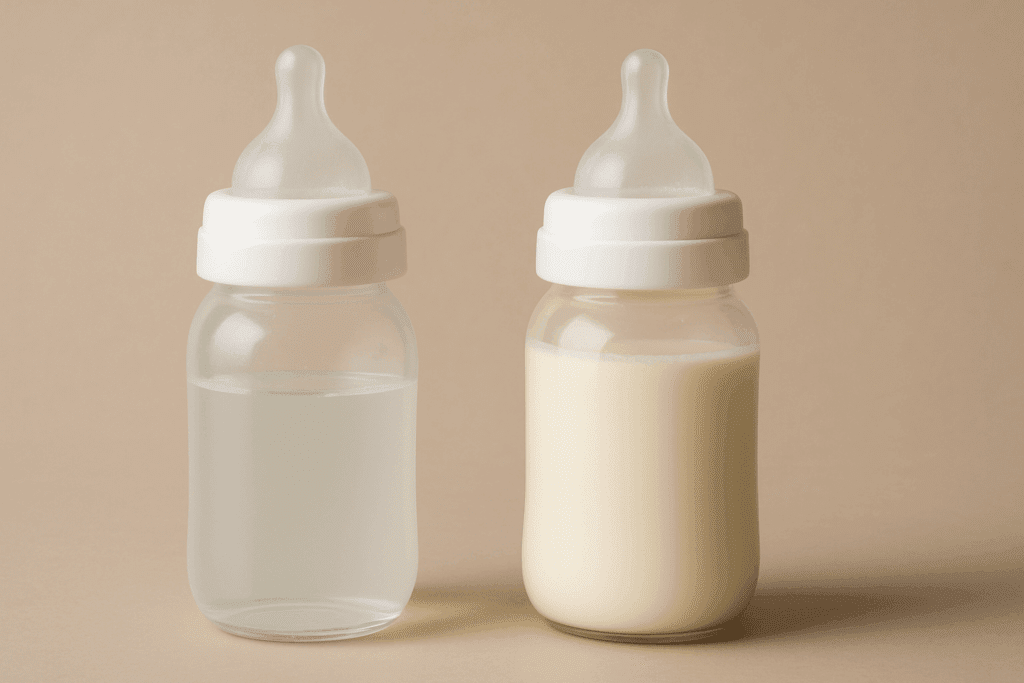New parents often find themselves overwhelmed by the complexities of newborn care, especially when trying to decipher feeding cues. One of the most common concerns voiced by caregivers is, “Why is my newborn still hungry after feeding?” This question arises not only from a place of love and attentiveness but also from confusion over whether the baby is truly receiving enough nourishment or if other factors are at play. Understanding the intricate balance of infant nutrition, development, and behavioral cues is essential in addressing this issue with clarity, compassion, and scientific accuracy.
You may also like: Essential Milestones in Baby Led Weaning: A Proven Guide to Nurturing Healthy Eating Habits

Decoding Hunger Cues: How to Tell If Baby Is Still Hungry After Feeding
Recognizing a newborn’s hunger signals is more nuanced than many realize. While crying is often considered the most apparent sign, it is typically a late indicator of hunger. More subtle and early cues include rooting, sucking on hands, smacking lips, or turning the head toward the breast or bottle. These actions suggest that the baby may still be hungry or has not yet achieved satiety. Learning how to tell if baby is still hungry after feeding involves closely observing these cues before and after a feeding session.
Sometimes, babies may continue to exhibit feeding behaviors even after a full meal. This can be due to the need for comfort, not necessarily hunger. Differentiating between the need to feed and the desire for soothing can help parents make more informed decisions. Additionally, growth spurts can significantly alter feeding patterns, causing babies who previously seemed content to suddenly act ravenous. Knowing when these developmental milestones occur can aid in setting realistic expectations.
Moreover, bottle-fed infants might finish a feed quickly and appear unsatisfied, while breastfed babies may need longer sessions due to differences in milk flow and the effort required to extract milk. These variables add layers of complexity to the feeding experience, making it crucial to consider context and individual variability when assessing whether a newborn is genuinely still hungry.

Why Is My Newborn Still Hungry After Feeding? Understanding the Growth Spurts
It is not uncommon for newborns to experience periods of rapid growth, typically occurring around 7-10 days, 2-3 weeks, 4-6 weeks, 3 months, and 6 months of age. During these times, a baby’s nutritional needs increase dramatically to support both physical development and neurological maturation. Consequently, it may seem like your newborn is constantly hungry, demanding more frequent and longer feeding sessions.
This phenomenon can leave parents wondering, “Why is my newborn still hungry after feeding, even when they just finished?” The answer often lies in the biological demands of growth. Babies instinctively increase their feeding frequency to stimulate greater milk production in breastfeeding mothers, ensuring their nutritional needs are met. This behavior, known as cluster feeding, is perfectly normal during growth spurts and is not necessarily indicative of inadequate milk supply or insufficient formula intake.
Understanding the connection between growth spurts and feeding behavior helps caregivers to respond appropriately without undue worry. Providing on-demand feedings during these critical periods supports healthy development and reinforces the infant’s trust in their environment. It also underscores the importance of flexibility and responsiveness in newborn care, as rigid feeding schedules may not align with a baby’s dynamic and evolving needs.

The Role of Digestion in Newborn Feeding Patterns
Newborns have immature digestive systems that are still developing in the early weeks of life. Because of this, they process milk quickly, often leading to shorter periods of satiety compared to older infants or adults. This fast digestion rate can make it seem like a newborn is always hungry, prompting frequent feedings that are entirely within the realm of normal.
This is especially true for breastfed babies, as breast milk is more easily digested than formula. As a result, breastfed newborns may feed every 1.5 to 3 hours, which can feel almost constant to an exhausted parent. Formula, on the other hand, takes longer to digest, which may stretch the time between feedings to approximately every 3 to 4 hours. Still, it’s common to hear concerns like “my baby is feeding every 2 hours on formula,” which may reflect either normal variability or specific issues such as insufficient feeding volume or high caloric demand.
In some cases, digestive discomfort can mimic hunger cues, leading parents to believe that their baby needs more food when the actual issue may be gas, reflux, or colic. This misunderstanding can result in overfeeding or unnecessary worry. Differentiating true hunger from digestive distress is key, and often requires a trial-and-error approach supported by pediatric guidance. Being attuned to patterns and subtle differences in behavior can make all the difference in achieving feeding success.

Why Is My Newborn Still Hungry After Feeding? Exploring Milk Supply and Latch Issues
For breastfeeding mothers, concerns about milk supply and latch effectiveness are frequent contributors to the worry that their newborn is still hungry after feeding. Poor latch can prevent a baby from extracting sufficient milk, even if the breast appears full. This may lead to short, ineffective feeding sessions and persistent hunger cues shortly thereafter.
Inadequate milk supply, whether due to hormonal issues, insufficient breastfeeding frequency, or improper pumping techniques, can also result in a baby not receiving enough nutrition. When a baby is frequently nursing but not gaining weight or producing an adequate number of wet diapers, it may signal a supply issue. In these instances, seeking support from a lactation consultant can be instrumental in identifying and resolving underlying problems.
Breastfeeding is a learned skill, both for mother and baby. Early challenges do not necessarily indicate long-term problems, but they do require timely attention. Identifying whether a baby is swallowing effectively, monitoring milk transfer, and employing proper positioning can enhance feeding efficiency and satisfaction. These measures not only address the immediate concern of hunger but also lay the foundation for a more successful breastfeeding journey.
Is My Baby Getting Enough? Evaluating Feeding Frequency and Duration
Assessing whether a newborn is receiving adequate nutrition involves looking at the bigger picture rather than focusing on individual feeding sessions. Healthy weight gain, appropriate diaper output (typically six or more wet diapers and three or more stools per day by the fifth day of life), and contentment between feedings are strong indicators that a baby is getting enough to eat.
Nevertheless, it is common for caregivers to observe variations in feeding duration and frequency and wonder if they signal a problem. A baby who feeds for only a few minutes may be efficient, or they may not be getting enough milk. Likewise, a baby who feeds frequently might be going through a growth spurt or may not be satisfied due to latch or supply issues. When in doubt, tracking feedings and consulting with a pediatrician can provide much-needed clarity.
Statements such as “newborn constantly hungry” or “my baby is feeding every 2 hours on formula” are frequently shared by concerned parents. While these experiences can fall within the spectrum of normal, they can also suggest areas for closer evaluation. The ultimate goal is not to meet a specific number of feedings but to ensure that each feeding is effective and that the baby’s growth and development remain on track.

Comfort Nursing vs. True Hunger: When Feeding Is About More Than Food
Newborns often seek the breast or bottle for reasons beyond hunger. Sucking is a powerful reflex that provides comfort, so it’s not uncommon for babies to nurse even when they are full. This behavior, known as comfort nursing, helps soothe anxiety, ease discomfort, and foster a sense of security.
Understanding the difference between comfort and hunger feeding can help caregivers respond with greater confidence. If a baby has recently fed well and is showing signs of sleepiness or general contentment while sucking, it may be more about emotional comfort than physical need. In these cases, offering a pacifier or engaging in skin-to-skin contact can satisfy the baby’s need for closeness without leading to overfeeding.
This distinction becomes particularly important during times of transition, such as illness, immunizations, or changes in routine. Babies may seek more frequent comfort feeding during these periods, which can be misinterpreted as constant hunger. Recognizing the full range of infant needs allows caregivers to offer appropriate support and reduce unnecessary stress around feeding.
Why Is My Newborn Still Hungry After Feeding? Common Misinterpretations of Satiety Signals
One of the most overlooked reasons caregivers ask “why is my newborn still hungry after feeding?” is due to misinterpreting signs that are not actually hunger-related. For instance, a baby who continues to suck or root after feeding may be tired, overstimulated, or simply engaging in self-soothing behavior. In these moments, it is crucial to consider the broader context of the baby’s behavior.
Satiety signals, such as relaxed posture, turning away from the nipple, or falling asleep, are not always easy to spot, especially in the chaos of early parenting. Babies may also cluster feed for several hours in the evening, making it seem like they are never full. This is a normal and temporary phase that supports increased milk production and should not be confused with inadequate feeding.
Furthermore, newborns are still adjusting to life outside the womb and may take time to regulate their feeding patterns. During this adjustment period, their behavior may appear inconsistent, but this does not necessarily point to a problem. Trusting the process while remaining observant can help distinguish between genuine hunger and other needs.

The Impact of Feeding Methods and Schedules on Infant Satiety
Feeding methods, including whether a baby is breastfed, formula-fed, or combination-fed, can significantly influence perceptions of hunger and fullness. Each method offers different experiences of flow, taste, and effort, all of which affect how long a baby stays full. For example, breastfed babies often have more variable feeding patterns, while formula-fed babies may appear more consistently satiated due to the denser caloric content of formula.
However, when parents say “my baby is feeding every 2 hours on formula,” it often prompts concern that something may be wrong. In reality, babies have individual needs that may not align with textbook expectations. Factors such as high metabolism, rapid growth, or temperament can all contribute to more frequent feeding intervals, even with formula.
Feeding on demand rather than adhering strictly to a schedule is generally more effective in meeting a newborn’s evolving nutritional needs. Rigid scheduling can disrupt hunger and fullness cues, leading to confusion and frustration for both baby and caregiver. By observing the baby’s cues and responding accordingly, parents can foster a more intuitive and satisfying feeding experience.

Nutritional Composition and Feeding Satisfaction: Understanding the Science
The composition of breast milk and formula plays a critical role in how satisfied a baby feels after feeding. Breast milk changes in composition throughout a feeding session and across the course of the day, adapting to the baby’s needs. The early milk, or foremilk, is higher in water content and helps quench thirst, while the later milk, or hindmilk, contains more fat and provides lasting fullness.
If a baby ends a session before reaching the richer hindmilk, they may still appear hungry. This can happen with short feedings or frequent switching between breasts. Ensuring that a baby empties one breast before moving to the other can help improve satisfaction. In the case of formula, the caloric density is more consistent, but volume and timing still matter.
Parents often wonder if their choice of formula could be contributing to their baby’s persistent hunger. While most standard formulas are designed to meet newborn nutritional needs, some babies may respond better to formulations with added protein, probiotics, or thicker consistencies. Consulting with a pediatrician before making changes ensures that adjustments are medically appropriate and beneficial.
Frequently Asked Questions: Why Is My Newborn Still Hungry After Feeding?
How do I know if my baby is really hungry or just needs comfort?
One of the most difficult distinctions to make as a parent is whether your newborn is actually hungry or seeking comfort. While hunger cues such as rooting, sucking motions, and hand-to-mouth gestures often indicate a need to eat, they can sometimes overlap with signs of stress or overstimulation. If your baby has recently eaten and is still showing these behaviors, try holding them skin-to-skin or offering a pacifier to see if the urge to suck is more about soothing than nutrition. Pay attention to whether your baby calms down with comfort alone or continues to exhibit escalating distress. This distinction becomes more intuitive with time and close observation, especially when you begin to notice patterns that differentiate hunger from emotional need.
Could my baby’s constant hunger be linked to underlying medical issues?
Although frequent feeding is often a normal part of infancy, especially during growth spurts, persistent hunger that doesn’t align with healthy weight gain could indicate an underlying medical concern. Conditions such as gastroesophageal reflux, malabsorption syndromes, or metabolic disorders can affect how effectively a baby utilizes the nutrition they receive. If you notice signs such as poor weight gain, excessive vomiting, diarrhea, or lethargy alongside the complaint that your “newborn always hungry,” it’s worth discussing with your pediatrician. Early detection of such conditions can ensure prompt treatment and improved feeding outcomes. Diagnostic tests like stool analysis, allergy testing, or metabolic screening may be recommended in some cases.
Why is my newborn still hungry after feeding, even after long nursing sessions?
In some cases, a newborn may seem unsatisfied even after long nursing sessions due to ineffective milk transfer. This can occur when a baby has a shallow latch, a tongue or lip tie, or if the breast is not emptied properly. It’s not uncommon for babies to remain latched for comfort, giving the impression that they’ve fed adequately when they haven’t taken in enough milk. Tracking swallowing sounds, breast softness post-feeding, and weight trends can help assess whether effective feeding is taking place. For ongoing concerns, consulting a certified lactation consultant can provide a thorough latch assessment and corrective strategies.
How to tell if baby is still hungry after feeding when they seem fussy?
Fussiness after feeding can stem from multiple causes, not all of which are related to hunger. To know how to tell if baby is still hungry after feeding, watch for consistent cues like searching for the nipple, lip smacking, or continued sucking on hands, especially if more than 20 minutes have passed since the last feed. If the baby seems content in your arms but fusses when laid down, this could indicate a need for comfort, not food. Alternatively, persistent crying with tensed limbs or arching of the back may hint at gas or reflux. Tracking the baby’s response to additional feeding attempts or soothing methods over time can help you discern their specific needs.
What should I do if my baby is feeding every 2 hours on formula and still seems unsatisfied?
If your baby is feeding every 2 hours on formula and showing continued hunger signs, consider reviewing the amount and type of formula given at each feed. Babies have individual caloric requirements, and some may simply need larger portions or more nutrient-dense options. Also, ensure your baby is feeding in a calm, distraction-free environment, as overstimulation can shorten feeding duration and lead to less intake. In some cases, slow flow nipples may cause frustration and make babies stop before they are full. It’s advisable to consult with a pediatrician or registered dietitian if increasing volume doesn’t improve satiety, to ensure your baby’s growth metrics remain on target.
Can frequent hunger mean my baby is experiencing a developmental leap?
Absolutely. Developmental leaps can significantly influence feeding behavior, often making it appear that your newborn is constantly hungry. During these cognitive or physical milestones, your baby’s brain requires more energy, which leads to increased appetite and a need for additional comfort. They may also have disrupted sleep, increased clinginess, and irregular feeding schedules. These shifts typically last a few days to a week and resolve as the developmental stage stabilizes. Understanding the timing of known leaps, such as the 5-week or 8-week mark, can offer reassurance and help you prepare for these temporary but intense phases.
Why is my newborn still hungry after feeding despite switching formulas?
When caregivers switch formulas hoping to address constant hunger, it’s important to remember that not all formulas affect babies in the same way. Some babies may have higher calorie demands or unique digestive needs that standard formula does not meet. If your newborn always seems hungry after a full formula bottle, a specialized formula with added calories, hydrolyzed proteins, or a thicker consistency might be more appropriate. However, frequent formula changes can upset a baby’s stomach, so transitions should be gradual and medically guided. Before making a switch, tracking diaper output and weight trends can provide useful insights for discussing with your healthcare provider.
Could my newborn constantly hungry behavior be tied to parental anxiety or misreading cues?
Parental anxiety can inadvertently contribute to feeding misinterpretations. In the early days, it’s natural to feel concerned about whether your baby is getting enough to eat, which can lead to offering food at every sign of discomfort. This reactive approach may cause overfeeding, especially in formula-fed infants, leading to digestive issues that mimic hunger cues. Learning to differentiate between various baby cues—like fatigue, overstimulation, or need for closeness—can help reduce unnecessary feeding. Joining a parenting group or working with a pediatric nurse can also provide emotional support and education to build confidence and clarify doubts about feeding adequacy.
Are there cultural or generational differences in interpreting newborn hunger?
Yes, cultural and generational views on infant feeding often shape how caregivers interpret hunger and fullness. Some traditions emphasize scheduled feeding, while others encourage on-demand responsiveness, each influencing parental expectations. Older generations may push for larger bottle volumes or supplementing with formula sooner, potentially clashing with modern breastfeeding advocacy. These perspectives can lead to conflicting advice that causes confusion about why is my newborn still hungry after feeding. Recognizing the influence of cultural narratives on parenting practices allows families to navigate advice with more discernment and tailor approaches that reflect both evidence-based care and personal values.
Why is my newborn still hungry after feeding and what should I do next?
When faced with the ongoing question, “why is my newborn still hungry after feeding?” the first step is to evaluate feeding mechanics, nutritional intake, and emotional context. While hunger is often the culprit, it can also be compounded by rapid growth, shallow latching, inefficient bottle flow, or simply a strong suck reflex seeking comfort. Consider implementing a feeding journal to track patterns and changes over several days, including volume, timing, cues, and post-feed behaviors. This can offer valuable insight when consulting healthcare providers. Long-term, building confidence in reading your baby’s cues and responding with calm consistency is key to easing stress and promoting a nourishing environment for both baby and caregiver.
How to tell if baby is still hungry after feeding when they wake up soon after?
It can be especially confusing when a baby wakes shortly after a feeding session and seems fussy. To determine how to tell if baby is still hungry after feeding in such cases, look for signs like vigorous sucking or rooting that starts as soon as they are picked up. If the baby calms with a pacifier or gentle rocking, hunger may not be the cause. Also, consider if your baby is transitioning through a light sleep cycle, which can naturally trigger brief awakenings. Over time, familiarity with your baby’s behavior and sleep-wake rhythms will help you differentiate between actual hunger and transitional sleep movements.
Conclusion: Supporting Healthy Feeding Habits: Trusting Your Instincts and Seeking Guidance
Navigating newborn hunger is both an art and a science. It involves not only understanding biological needs but also tuning into emotional signals and developmental cues. Parents are encouraged to trust their instincts while staying informed through credible resources and medical guidance. Acknowledging that each baby is unique helps alleviate the pressure to fit into predefined molds.
When questions persist, such as “why is my newborn still hungry after feeding?” or “how to tell if baby is still hungry after feeding,” seeking reassurance from a trusted healthcare provider can provide peace of mind. Whether it’s through regular pediatric checkups, lactation consultations, or support groups, finding a network of informed allies can make the parenting journey feel more manageable and less isolating.
Ultimately, supporting a baby’s nutritional journey is about responsiveness, patience, and ongoing learning. By embracing the evolving nature of infant care and remaining open to adaptation, caregivers can nurture not only their baby’s body but also their emotional well-being and trust in the world around them.
Further Reading:
Why Is My Newborn Still Hungry After Feeding
Newborn Always Hungry After Nursing? Here’s What’s Happening!
Never Satisfied? Here’s Why Baby is Still Hungry After Breastfeeding



